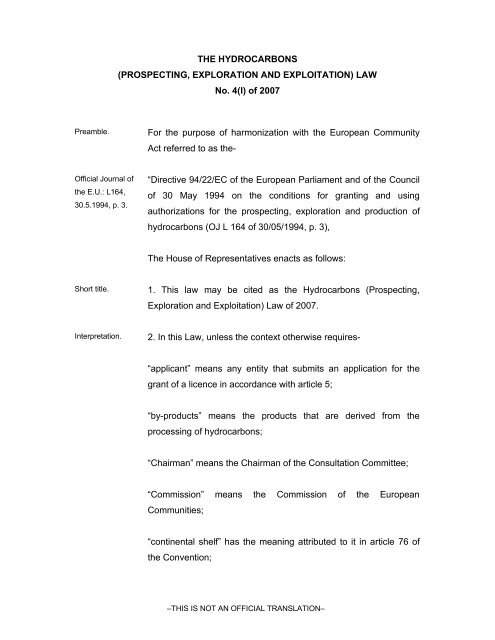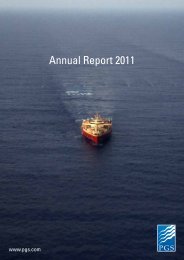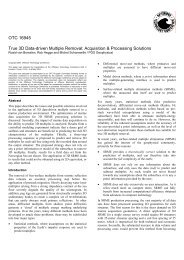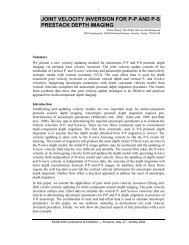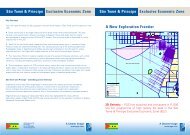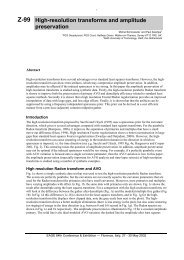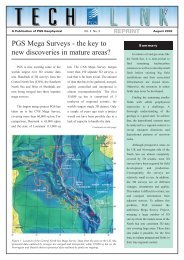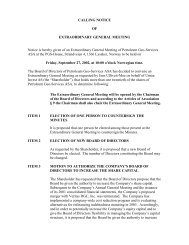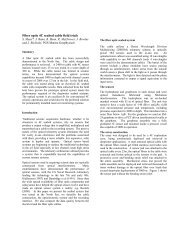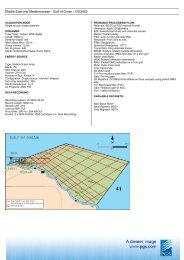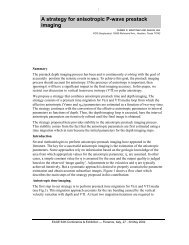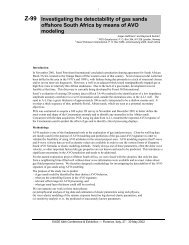THE HYDROCARBONS (PROSPECTING, EXPLORATION ... - PGS
THE HYDROCARBONS (PROSPECTING, EXPLORATION ... - PGS
THE HYDROCARBONS (PROSPECTING, EXPLORATION ... - PGS
You also want an ePaper? Increase the reach of your titles
YUMPU automatically turns print PDFs into web optimized ePapers that Google loves.
<strong>THE</strong> <strong>HYDROCARBONS</strong><br />
(<strong>PROSPECTING</strong>, <strong>EXPLORATION</strong> AND EXPLOITATION) LAW<br />
No. 4(I) of 2007<br />
Preamble.<br />
For the purpose of harmonization with the European Community<br />
Act referred to as the-<br />
Official Journal of<br />
the E.U.: L164,<br />
30.5.1994, p. 3.<br />
“Directive 94/22/EC of the European Parliament and of the Council<br />
of 30 May 1994 on the conditions for granting and using<br />
authorizations for the prospecting, exploration and production of<br />
hydrocarbons (OJ L 164 of 30/05/1994, p. 3),<br />
The House of Representatives enacts as follows:<br />
Short title.<br />
1. This law may be cited as the Hydrocarbons (Prospecting,<br />
Exploration and Exploitation) Law of 2007.<br />
Interpretation.<br />
2. In this Law, unless the context otherwise requires-<br />
“applicant” means any entity that submits an application for the<br />
grant of a licence in accordance with article 5;<br />
“by-products” means the products that are derived from the<br />
processing of hydrocarbons;<br />
“Chairman” means the Chairman of the Consultation Committee;<br />
“Commission” means the Commission of the European<br />
Communities;<br />
“continental shelf” has the meaning attributed to it in article 76 of<br />
the Convention;<br />
–THIS IS NOT AN OFFICIAL TRANSLATION–
2<br />
203 of 1988.<br />
“Convention” means the United Nations Convention on the Law of<br />
the Sea that was opened for signature on 28 th July 1994 and was<br />
ratified by the United Nations Convention on the Law of the Sea<br />
(Ratifying) Law of 1988, as in force in the Republic from time to<br />
time;<br />
“Council” means the Council of the European Communities;<br />
“Court” means Court as referred to in section 32;<br />
“entity” means a natural or legal person or a group thereof that<br />
submits or is likely to submit an application for a licence or is the<br />
holder of licence;<br />
140(I) of 2005.<br />
“environmental authority” has the meaning attributed to it in the<br />
Assessment of Impact on the Environment from Certain Works<br />
Law;<br />
“exploitation of hydrocarbons” means the development and<br />
production of hydrocarbons or any treatment in order to make them<br />
marketable and the storage and the transportation of the<br />
hydrocarbons and their by-products to the loading installations for<br />
further disposal. In the abovementioned treatment, refining is not<br />
included;<br />
"exploration for hydrocarbons" means the exploration for the<br />
discovery of hydrocarbon deposits by any appropriate method,<br />
including drilling;<br />
“hydrocarbon exploitation licence” means the right to exploit<br />
hydrocarbons in a geographical area;<br />
“hydrocarbon exploration licence” means the right to explore for<br />
–THIS IS NOT AN OFFICIAL TRANSLATION–
3<br />
hydrocarbons in a geographical area;<br />
"hydrocarbon prospecting licence" means the right to prospect for<br />
hydrocarbons in a geographical area;<br />
"hydrocarbons" means any kind of petroleum products in solid,<br />
liquid or gaseous state, including crude oil or natural gasoline,<br />
natural hydrocarbon gases as well as all related minerals or<br />
substances of any kind extracted together therewith;<br />
“licence” means the hydrocarbon prospecting and/or exploration<br />
and/or exploitation licence in a geographical area;<br />
"licensee" means any person to whom a licence has been granted<br />
by the Council of Ministers in accordance with the provisions of this<br />
Law;·<br />
“member state” means member state of the European Union;<br />
“Minister” means the Minister of Commerce, Industry and Tourism;<br />
“prospecting for hydrocarbons” means the attempt to locate<br />
hydrocarbons and/or to evaluate the hydrocarbon potential by any<br />
appropriate method other than drilling;·<br />
“third country” means a country that is not a member state;<br />
90 of 1972<br />
56 of 1982<br />
7 of 1990<br />
28 of 1991<br />
91(I) of 1992<br />
55(I) of 1993<br />
72(I) of 1998<br />
59(I) of 1999<br />
“town planning authority” has the meaning attributed to it in the<br />
Town Planning and Land Planning Law.<br />
–THIS IS NOT AN OFFICIAL TRANSLATION–
4<br />
142(I) of 1999<br />
241(I) of 2002<br />
29(I) of 2005.<br />
Ownership of<br />
hydrocarbons.<br />
3.-(1) The ownership of hydrocarbons wherever they occur in<br />
Cyprus, including the Territorial Waters, the continental shelf and<br />
the Exclusive Economic Zone of the Republic, belongs and it is<br />
deemed that it always belonged to the Republic.<br />
64(I) of 2004.<br />
(2) The ownership rights of the hydrocarbons that are situated in<br />
the zone of offshore jurisdiction of the Republic, as they are<br />
determined in the Exclusive Economic Zone Law, shall be<br />
exercised in conjunction with the rights in the continental shelf as<br />
they are determined in the Convention.<br />
Determination of<br />
the areas on which<br />
the activities can<br />
be exercised and<br />
refusal to allow<br />
access to the<br />
activities on the<br />
grounds of national<br />
security.<br />
4.-(1) The Council of Ministers retains the right to determine within<br />
the territory of the Republic as well as in areas where the Republic<br />
has sovereign rights and jurisdiction as far as prospecting,<br />
exploration and exploitation of hydrocarbons concerns, according<br />
to the Convention or other international convention or internal<br />
legislation, the areas that are available for the exercise of the<br />
activities of prospecting, exploration and exploitation of<br />
hydrocarbons.<br />
(2) Whenever an area is available for exercising the activities<br />
set out in subsection (1), the Council of Ministers shall ensure that<br />
there is no discrimination between entities as regards access to,<br />
and exercise of, those activities.<br />
(3) The Council of Ministers may, on grounds of national<br />
security, refuse to allow access to and exercise of the activities<br />
referred to in subsection (1) by any entity that is effectively<br />
controlled by a third country or a third country national.<br />
–THIS IS NOT AN OFFICIAL TRANSLATION–
5<br />
Granting of<br />
licences and<br />
conditions for their<br />
granting.<br />
5.-(1) The Council of Ministers may grant a licence, following the<br />
submission of applications by the entities to the Minister, for which<br />
the procedure shall be initiated in the following manners -<br />
(a) at the initiative of the Council of Ministers, through<br />
invitation by the Minister for the submission of<br />
applications, the invitation to be published in the Official<br />
Gazette and/or the Official Journal of the European Union<br />
at least 90 days before the closing date for the<br />
submission of applications; or<br />
(b) by means of invitation published by the Minister, with the<br />
approval of the Council of Ministers, in the Official Gazette<br />
and/or the Official Journal of the European Union inviting<br />
the submission of applications, following the submission<br />
of an application by an entity. Any other interested entities<br />
shall have a period of at least 90 days after the date of<br />
publication in which to submit an application.<br />
(2) For the purposes of subsection (1), the invitation to submit<br />
applications shall specify the type of licence, all the geographical<br />
areas which consist or may consist, in whole or in part, the object<br />
of the application, the proposed date or time limit for granting the<br />
licence, any conditions or requirements which the Council of<br />
Ministers considers should be made public during the procedure for<br />
submission of the applications, whether preference is given to the<br />
applications of entities which are autonomous and non-dependant<br />
natural or legal persons and anything at all that is considered<br />
essential to be determined in the invitation.<br />
(3) When the geographical areas that are made available for the<br />
grant of hydrocarbon exploration or exploitation licences are not<br />
delimited on the basis of a prior geometric division of the territory,<br />
–THIS IS NOT AN OFFICIAL TRANSLATION–
6<br />
the Council of Ministers shall determine, by a notification published<br />
in the Official Gazette and/or the Official Journal of the European<br />
Union, the extent of each area in such a way that it does not<br />
exceed what is justified for the exercise of the activities in the best<br />
possible way from the technical and economic point of view.<br />
(4) The procedure for submission of applications and granting of<br />
licences in accordance with subsection (1) may not be initiated and<br />
licences may be granted by the Council of Ministers when the area<br />
for which a licence is requested:<br />
(a) is available on a permanent basis and this has been set<br />
forth in the invitation that has been published for the<br />
submission of applications or<br />
(b) has been the object of a previous procedure in<br />
accordance with subsection (1) and did not result in the<br />
granting of the licence or<br />
(c)<br />
has been abandoned by an entity and does not fall<br />
automatically under paragraph (a).<br />
(5) In applying subsection (4), the Minister shall publish a<br />
notification in the Official Gazette and/or an announcement in the<br />
Official Journal of the European Union, indicating the areas which<br />
are available and where the applicants may obtain the relevant<br />
detailed information. Any significant change of this information<br />
shall be the subject of an additional announcement.<br />
(6) The Council of Ministers may decide that the provisions of<br />
subsection (1) do not apply, when geological or production criteria<br />
justify the grant of a licence for an area to an entity that holds a<br />
licence for a contiguous area. In such a case, the Council of<br />
–THIS IS NOT AN OFFICIAL TRANSLATION–
7<br />
Ministers ensures that the licensees for other contiguous areas are<br />
in a position to submit relevant applications and they are given<br />
sufficient time to do so.<br />
(7)(a) The following shall not be considered as the grant of a<br />
licence within the meaning of subsection (1):<br />
(i) the grant of a licence solely by reason of a change of<br />
name or ownership of an entity holding an existing<br />
licence or a change in the composition of such an<br />
entity or a transfer of licence or assignment of rights<br />
that arise from a licence;<br />
(ii) the grant of a licence to an entity possessing another<br />
form of licence where the possession of such a<br />
licence implies the right to the grant of the former<br />
licence;<br />
(iii) the decision of the Council of Ministers, taken within<br />
the framework of granting a licence which relates to<br />
the commencement, interruption, extension or<br />
cessation of the activities of the licence granted;<br />
(iv) the decision of the Council of Ministers to proceed<br />
through governmental authorities, supported by<br />
special consultants or experts, to surveys for the<br />
evaluation of the hydrocarbon potential of the<br />
country.<br />
–THIS IS NOT AN OFFICIAL TRANSLATION–
8<br />
(b) Where the provisions of subsection (7)(a)(i) apply, the<br />
entity shall inform the Minister whenever a change is<br />
made in the name or ownership of the entity that holds a<br />
valid licence or the composition of the entity or where<br />
there is a transfer of the licence or assignment of rights<br />
arising from the licence. Where this obligation is not<br />
fulfilled, the granted licence may be cancelled and the<br />
entity shall be liable for the cancellation.<br />
(c)<br />
No person may possess a licence when the provisions of<br />
subsection (7)(a)(i) apply, without the prior approval of the<br />
Council of Ministers.<br />
(d) Any entity that possesses a licence in accordance with<br />
the provisions of subsection (7)(a)(i), without the prior<br />
approval of the Council of Ministers, is guilty of an offence<br />
and shall be liable, on conviction, to imprisonment for a<br />
term not exceeding twelve months or to a fine not<br />
exceeding five hundred thousand Cyprus pounds or to<br />
both such fine and imprisonment.<br />
Establishment of<br />
the Consultation<br />
Committee.<br />
6.-(1) For the purpose of this Law, a Consultation Committee is<br />
established, which is composed of the following members:<br />
(a)<br />
the Permanent Secretary of the Ministry of Commerce,<br />
Industry and Tourism, who acts as the Chairman of the<br />
Committee, or his representative;<br />
(b) the Attorney General of the Republic or his<br />
representative;<br />
(c)<br />
the Permanent Secretary of the Ministry of Foreign<br />
Affairs or his representative;<br />
–THIS IS NOT AN OFFICIAL TRANSLATION–
9<br />
(d)<br />
the Permanent Secretary of the Ministry of Finance or<br />
his representative;<br />
(e)<br />
the Permanent Secretary of the Ministry of Agriculture,<br />
Natural Resources and the Environment or his<br />
representative;<br />
(f)<br />
the Director of the Geological Survey Department or his<br />
representative;<br />
(g)<br />
the Director of the Energy Service or his representative.<br />
(2) All the applications shall be addressed to the Minister, who<br />
convenes a meeting of the Consultation Committee by a written<br />
notice to the Chairman of the Consultation Committee to<br />
commence the procedure for the evaluation of the applications, in<br />
accordance with the provisions of section 10.<br />
Meetings of the<br />
Consultation<br />
Committee and<br />
procedures.<br />
7.-(1) The Chairman of the Consultation Committee supervises its<br />
functions, prepares the agenda of every meeting and takes the<br />
necessary steps so that the agenda, together with the written<br />
invitation to the meeting, is sent to each member at least twenty<br />
four hours prior to the meeting.<br />
(2) The Consultation Committee acts as a quorum when the<br />
Chairman and at least four members are present.<br />
(3) Any matter in relation to the internal functioning of the<br />
Consultation Committee shall be regulated by a decision, taken<br />
with absolute majority.<br />
–THIS IS NOT AN OFFICIAL TRANSLATION–
10<br />
Responsibilities of<br />
the Consultation<br />
Committee.<br />
8.-(1) The Consultation Committee has a duty to examine the<br />
content of the applications that are submitted in accordance to this<br />
Law, to evaluate the applications for the granting of hydrocarbon<br />
prospecting, exploration and exploitation licences, as well as to<br />
evaluate any issue that appears in relation to the applications or is<br />
put before it for examination and to advise the Minister on any<br />
issue that arises during the application of the provisions of this<br />
Law.<br />
(2) More specifically and without prejudice to the generality of<br />
subsection (1), the Consultation Committee may examine and<br />
submit advice to the Minister in relation to the following matters:<br />
(a)<br />
any issue that may arise prior to the beginning of the<br />
procedure for the submission of the applications;<br />
(b)<br />
whether an application that is submitted in accordance<br />
with this Law shall be approved or rejected;<br />
(c)<br />
the transfer of a licence or the assignment of rights<br />
arising from a licence from the licensee to another<br />
entity;<br />
(d)<br />
the imposition of any conditions to the applicant on the<br />
approval of his application, as well as any revision of<br />
these conditions;<br />
(e)<br />
the degree of threat to the environment that may arise<br />
from the grant of an exploration licence and an<br />
exploitation licence to any entity and any protection<br />
measures ;<br />
–THIS IS NOT AN OFFICIAL TRANSLATION–
11<br />
(f)<br />
the safety measures that have to be imposed in every<br />
case and the measures to ensure that persons who take<br />
part in these activities have the necessary qualifications;<br />
(g)<br />
measures for the protection of navigation;·<br />
(h)<br />
any other matter that the Consultation Committee<br />
considers necessary and which is related to the<br />
applications.<br />
Powers and<br />
obligations of the<br />
Consultation<br />
Committee.<br />
9.-(1) The Consultation Committee may, through its Chairman,<br />
convene a meeting, and/or be consulted by, experts on matters<br />
regarding the prospecting, exploration and exploitation of<br />
hydrocarbons, including any public officer or representatives of any<br />
organisation of public or private law, as well as any person whose<br />
opinion or expert knowledge on a particular matter may be<br />
considered useful or necessary.<br />
(2) The Consultation Committee may appoint special technical<br />
committees for the examination of specialised issues that are<br />
raised during the examination of any application or any other issue,<br />
to set their terms of reference and function and to take into account<br />
the conclusions of the studies that they carry out.<br />
–THIS IS NOT AN OFFICIAL TRANSLATION–
12<br />
Procedure for<br />
examining the<br />
applications by the<br />
Consultation<br />
Committee.<br />
10.-(1) After the receipt of an application, which is submitted in<br />
accordance with section 5 and taking into account of the provisions<br />
of section 6(2), the Chairman shall send, without delay, a copy of<br />
the application to the members of the Consultation Committee and<br />
convene a meeting within 30 days for Committee to examine the<br />
application in accordance with the provisions of the following<br />
sections (2), (3) and (4). The Chairman may convene an<br />
exceptional meeting if he deems it necessary for various reasons<br />
either on his own initiative or on the request in writing from at least<br />
one member of the Consultation Committee. In case that an<br />
exceptional meeting is requested by a member of the Consultation<br />
Committee, then the Chairman must decide whether the reason<br />
raised by the member of the Committee justifies such a meeting.<br />
(2) During the above-mentioned meeting, the Consultation<br />
Committee shall consider whether the application is submitted in<br />
accordance with the provisions of this Law and whether the<br />
information that it contains is adequate for the evaluation of the<br />
application and the granting of a licence.<br />
(3) If during the meeting, the Consultation Committee considers<br />
that the information before it is not adequate or complete, it may<br />
request from the applicant or a third person any additional<br />
information it deems necessary or it may request the carrying out<br />
of inspections or obtaining the opinion of or reports by consultants<br />
or other experts on the matter.<br />
(4) If the Consultation Committee considers during the meeting<br />
that the information that is before it is sufficient, it examines the<br />
application and submits a reasoned opinion to the Minister as to<br />
whether the licence is to be granted and on which terms or as to<br />
whether the application is to be rejected. The opinion shall be<br />
contained in an advisory report, prepared by the Consultation<br />
–THIS IS NOT AN OFFICIAL TRANSLATION–
13<br />
Committee, with a procedure decided by it. The Minister submits<br />
his opinion in relation to the applications and the advisory report of<br />
the Consultation Committee to the Council of Ministers for final<br />
decision.<br />
Environmental<br />
impact study.<br />
11.-(1) The entity that submits an application for a hydrocarbon<br />
exploration licence shall include in its application a short notice<br />
stating the hydrocarbon exploration activities and the possible<br />
impact that the exploration activities will have on the environment<br />
and ways of its effective handling.<br />
140(Ι) of 2005<br />
(2)(a) Subject to the provisions of sub-section (b), the entity that<br />
submits an application for a hydrocarbon exploitation licence is<br />
obliged to comply with the provisions of the Assessment of Impact<br />
on the Environment from Certain Works Law.<br />
(b)<br />
Notwithstanding the provisions of the Assessment<br />
Impact on the Environment from Certain Works Law, the<br />
applications, reports and other documents whose<br />
submission is provided in the said law, are submitted to<br />
the Minister when they refer to works that fall within the<br />
provisions of the present Law, and the Minister forwards<br />
them in due course to the town planning or<br />
environmental authority, according to the case.<br />
Criteria for the<br />
evaluation of the<br />
applications.<br />
12.-(1) The criteria on which the applications are evaluated shall be<br />
published in the Official Gazette and the Official Journal of the<br />
European Union prior to the commencement of the period for<br />
submitting applications. If the criteria have already been published<br />
in the Official Gazette, the publication in the Official Journal of the<br />
European Union may be limited to a reference of the publication in<br />
the Official Gazette. Any amendment to the criteria shall be<br />
published in full in the Official Gazette and the Official Journal of<br />
–THIS IS NOT AN OFFICIAL TRANSLATION–
14<br />
the European Union. The criteria may relate to:<br />
(a)<br />
national security and public interest;·<br />
(b)<br />
the technical and financial ability of the applicant;·<br />
(c)<br />
the ways in which the applicant intends to carry out the<br />
activities that are specified in the licence;<br />
(d)<br />
when the licence is provided for financial consideration,<br />
the financial consideration that the applicant is offering<br />
in order to obtain the licence;<br />
(e)<br />
any lack of efficiency and responsibility that the<br />
applicant has shown under a previous licence.<br />
(2) In case where two or more applicants that are evaluated in<br />
accordance with the criteria of subsection (1) are deemed equal,<br />
then the Council of Ministers may adopt additional relevant criteria<br />
in order to choose to which entity the licence shall be granted.<br />
These additional criteria shall be published in the Official Gazette<br />
and in the Official Journal of the European Union.<br />
(3) Subject to section (3) of article 4, the Council of Ministers<br />
shall apply the above-mentioned criteria in such a way as to avoid<br />
discriminating between applicants.<br />
(4) The Council of Ministers may refuse the granting of a licence<br />
provided that discrimination is not introduced between the<br />
applicants.<br />
(5) When an application is rejected, then the reason for rejection<br />
shall be notified to the applicant.<br />
–THIS IS NOT AN OFFICIAL TRANSLATION–
15<br />
Terms and<br />
conditions for<br />
granting a licence.<br />
13.-(1) The licences may be granted on such terms and conditions<br />
so that the following purposes are safeguarded:<br />
(a)<br />
the proper performance of the activities that the licence<br />
permits;<br />
(b)<br />
the financial contribution in money or in hydrocarbons;<br />
(c)<br />
national security;<br />
(d)<br />
public safety;<br />
(e)<br />
public health;·<br />
(f)<br />
security of transport;<br />
(g)<br />
the protection of the environment in accordance to<br />
section 11 and the terms specified in the Regulations<br />
that are issued under this Law;<br />
(h)<br />
the protection of biological and mineral resources and of<br />
national treasures possessing artistic, historic or<br />
archaeological value;<br />
(i)<br />
the safety of installations and workers;·<br />
(j)<br />
the planned management of the hydrocarbon resources,<br />
such as particularly the rate at which they are depleted<br />
or the optimisation of their recovery;<br />
(k)<br />
the need to ensure revenue to the Republic.<br />
–THIS IS NOT AN OFFICIAL TRANSLATION–
16<br />
(2) The terms and conditions for the granting of licences shall<br />
be applied in such a way so that discrimination is not introduced<br />
between the applicants.<br />
(3) The conditions and requirements concerning the exercise or<br />
termination of the activity, which apply to each type of licence by<br />
virtue of the laws, regulations and administrative provisions in force<br />
at the time of submission of the applications, as well as any of their<br />
amendment during the procedure of examining the applications,<br />
shall be notified to the interested entities.<br />
Granting of rights<br />
to the licensees.<br />
14.-(1) The hydrocarbon prospecting licence grants to the licensee<br />
rights to prospect for hydrocarbons in the area for which the licence<br />
was granted, under the terms and conditions of the licence<br />
granted.<br />
(2) The hydrocarbon exploration licence grants to the licensee<br />
exclusive rights to explore for hydrocarbons in the area for which<br />
the licence was granted, under the terms and conditions of the<br />
licence granted, and in the case of a commercial discovery the<br />
right to be granted an exploitation licence related to such a<br />
discovery, in accordance to the provisions of this Law and the<br />
Regulations.<br />
(3) The hydrocarbon exploitation licence grants to the licensee<br />
exclusive rights to exploit hydrocarbons in the area for which the<br />
licence was granted, under the terms and conditions of the licence<br />
granted.<br />
Duration of validity<br />
of the licence.<br />
15. The duration of validity of the licence shall not exceed the time<br />
that is necessary for the conclusion of the activities that are<br />
specified in the licence. The Council of Ministers renews or<br />
extends the licence for such a period as it is provided in the<br />
–THIS IS NOT AN OFFICIAL TRANSLATION–
17<br />
Contract between the government of the Republic and the licensee<br />
and in accordance with the terms and conditions of the licence.<br />
Participation of the<br />
Republic in the<br />
activities of<br />
hydrocarbon<br />
prospecting,<br />
exploration and<br />
exploitation.<br />
16.-(1) The management of the participation of the Republic in the<br />
activities of prospecting, exploration and exploitation of<br />
hydrocarbons may be carried out by the Republic itself or by<br />
means of a legal person determined by the Council of Ministers.<br />
(2) The conditions for paying the contributions that are<br />
mentioned in section 13(1)(b), as well as any claim for the<br />
Republic’s participation, are prescribed by the Council of Ministers<br />
in such a way that the independence of management of the entities<br />
is preserved.<br />
(3) Where the grant of licences is subject to the participation of<br />
the Republic in the activities, and where a legal person has been<br />
entrusted solely for the purpose of this participation, or when the<br />
Republic itself manages the activities, neither the legal person nor<br />
the Republic shall be prevented from assuming the rights and the<br />
obligations associated with such participation, provided that the<br />
Republic:<br />
(a)<br />
shall not provide any information nor exercise any voting<br />
rights on decisions regarding sources of procurement of<br />
the entity;<br />
(b)<br />
shall not exercise in combination with any public entities<br />
a majority voting right; and<br />
–THIS IS NOT AN OFFICIAL TRANSLATION–
18<br />
(c)<br />
voting shall be based exclusively on transparent and<br />
objective principles that shall not introduce<br />
discrimination and shall not prevent the relevant<br />
administrative decisions of the entity to be based on<br />
common commercial principles.<br />
(4) Without prejudice to the provisions of section (3), the legal<br />
person or the Republic may oppose any decision of the entity,<br />
which does not conform to the conditions and requirements of the<br />
granting of the licence, regarding the depletion of the reserves and<br />
the protection of the financial interests of the Republic:<br />
Provided that, the option to oppose a decision shall be<br />
exercised in a non-discriminatory manner, particularly regarding<br />
decisions on investment and sources of supply of the licensee,<br />
unless they breach the national legislation or the international<br />
legality.<br />
(5) Where the Republic’s participation in the activities is<br />
managed by a legal person, which also holds a licence, then:<br />
(a)<br />
the legal person shall keep separate accounts for its<br />
commercial role and its role as manager of the<br />
Republic’s participation; and<br />
(b)<br />
it shall ensure that there is no flow of information from<br />
the legal person responsible for the management of the<br />
Republic’s participation to the legal person which holds<br />
a licence.<br />
(6) If the legal person responsible for the management of the<br />
Republic’s participation engages the legal person that holds a<br />
licence as a consultant, the former may provide the latter with the<br />
–THIS IS NOT AN OFFICIAL TRANSLATION–
19<br />
necessary information for the execution of his functions as<br />
consultant. The licensees, to whom the information relates, shall<br />
be informed in advance of the content of the information, so that<br />
they have sufficient time to raise objections, which are submitted to<br />
the Minister and the Minister decides after hearing the views on the<br />
matter from the two parties.<br />
Information that<br />
has to be provided<br />
by the licensees.<br />
17. The Minister may request the licensees to provide information<br />
on existing or future sources of their supply in relation to their<br />
obligations under their licences, or for any other matter that is<br />
considered necessary by the Minister, either at regular intervals or<br />
when he considers it necessary. The Minister may request this<br />
information as long as it is justified on the following grounds:<br />
(a)<br />
public morality;<br />
(b)<br />
public order;<br />
(c)<br />
public security;<br />
(d)<br />
protection of health and life of humans, animals or<br />
plants;<br />
(e)<br />
protection of national treasures possessing artistic,<br />
historic or archaeological value;<br />
((f)<br />
protection of industrial and commercial property;<br />
(g)<br />
observance of the national and international legality.<br />
Report to the<br />
Commission.<br />
18. The Minister shall publish in the Official Gazette each year, and<br />
notify the Commission, a report that contains information on the<br />
geographical areas for which licences have been granted, on the<br />
–THIS IS NOT AN OFFICIAL TRANSLATION–
20<br />
type of the licences granted, on the licensees and their<br />
composition, as well as on the estimated reserves in the Republic.<br />
Authorised<br />
officers.<br />
19.-(1) The Minister may, by notification published in the Official<br />
Gazette, authorise an appropriate person or persons to act as<br />
authorised public officers for the enforcement of this Law and the<br />
Regulations issued under it and the terms of the licence.<br />
(2) The authorised public officers may carry out any or all of the<br />
following:<br />
(a) enter at any reasonable time, showing their<br />
professional certificate upon request and without prior<br />
warning, any building or premises or any other place, in<br />
which they have reasonable cause to believe that there<br />
is an infringement of the conditions of the licence or any<br />
other infringement of this Law and the Regulations:<br />
Provided that an authorised public officer may not<br />
enter any residence without the prior ensuring of a<br />
judicial warrant;<br />
(b) carry out such searches, examinations, tests,<br />
inspections, reviews and investigations that may be<br />
necessary to establish whether there is an infringement<br />
of the conditions of the licence of a licensee or any other<br />
infringement of this Law and to inspect, take extracts or<br />
copies of documents that are related to the<br />
hydrocarbons activities;<br />
–THIS IS NOT AN OFFICIAL TRANSLATION–
21<br />
138 (Ι) of 2001<br />
37(Ι) of 2003.<br />
(c)<br />
keep copies of any evidence or records for which they<br />
have a reasonable cause to believe that, may be<br />
needed for the purpose of providing evidence in criminal<br />
or civil proceedings for any offence committed under this<br />
Law and keep copies of any information that is required<br />
to be given to the Minister in accordance with section<br />
17, notwithstanding the provisions of Processing of<br />
Personal Data (Protection of the Individual) Laws;<br />
(d)<br />
carry out anything that is considered necessary and<br />
reasonable in order to ensure that the provisions of this<br />
Law and the Regulations issued under it are observed.<br />
(e)<br />
enter at all reasonable times, showing the certificate of<br />
his status, if required, and without any prior notice to any<br />
building, structure, area, vehicle, vessel or aircraft, and<br />
to examine any machinery or equipment, which has<br />
been, is being or is to be used in connection with the<br />
hydrocarbon operations;<br />
(f)<br />
take samples of hydrocarbons, water or other liquid,<br />
gaseous or solid substances and make such<br />
examinations, analyses, tests, checks, inspections and<br />
inquiries as are necessary to establish whether there is<br />
an infringement of the conditions of the licence of the<br />
licensee or any infringement of this Law and the<br />
Regulations.<br />
–THIS IS NOT AN OFFICIAL TRANSLATION–
22<br />
(3) Any licensee and any person who is the owner, occupier or<br />
person in charge of any building, structure, area, vehicle, vessel or<br />
aircraft, machinery or equipment referred to in sub-section (2), shall<br />
provide the Minister with all reasonable assistance, including the<br />
provision of necessary means of transport, for the effective<br />
exercise of the his powers.<br />
Confidential<br />
information and<br />
confidentiality of<br />
the received<br />
information.<br />
15(Ι) of 2000.<br />
20.-(1) Any evidence and information collected and used by an<br />
authorised public officer in accordance with the provisions of this<br />
Law, shall be considered confidential within the meaning of section<br />
13 of the Statistics Law.<br />
(2) Any authorised public officer who takes part in the carrying<br />
out of searches or inspections, as provided for in sub-section (2) of<br />
section 19 and without a lawful authorisation by the Minister<br />
publishes or notifies to any unauthorised person information that<br />
he has been given or received during the exercise of his duties,<br />
commits an offence, and in case of a conviction, shall be liable to<br />
imprisonment for a term not exceeding twelve months or to a fine<br />
not exceeding twenty thousand pounds or to both such<br />
imprisonment and fine:<br />
Provided that, the obligation for confidentiality shall not<br />
apply-<br />
(a)<br />
when the written consent of the person that is<br />
responsible for the management, functioning,<br />
maintenance or keeping of the building or the premises<br />
in which the searches, examinations, tests, inspections,<br />
reviews and investigations in accordance with subsection<br />
(2) of section 19, has been given;<br />
–THIS IS NOT AN OFFICIAL TRANSLATION–
23<br />
(b)<br />
before a Court;<br />
Section 44<br />
36 of 1982<br />
84 of 1983.<br />
(c)<br />
before an Investigation Committee which has been<br />
appointed and acts in accordance to the Investigation<br />
Committees Law;<br />
Chapter 155<br />
92 of 1972<br />
2 of 1975<br />
12 of 1975<br />
41 of 1978<br />
162 of 1989<br />
142 of 1991<br />
9 of 1992<br />
10(Ι) of 1996<br />
89(Ι) of 1997<br />
54(Ι)of 1998<br />
96(Ι) of 1998<br />
14(Ι) of 2001.<br />
(d) before a criminal investigator that conducts an<br />
interrogation in accordance with section 4 of the<br />
Criminal Procedure Law.<br />
61(Ι) of 1996<br />
25(Ι) of 1997<br />
41(Ι) of 1998<br />
120(Ι) of 1999<br />
152(Ι) of 2000.<br />
(e)<br />
before the Unit for the Suppression of Crimes of<br />
Concealment in accordance with the Concealment,<br />
Investigation and Confiscation of Income from Certain<br />
Criminal Acts Laws.<br />
207(Ι) of 1989<br />
87(Ι) of 2000<br />
155(Ι) of 2000.<br />
(f)<br />
before the Committee for the Protection of Competition<br />
in the context of exercising its powers, in accordance<br />
with the Protection of Competition Laws.<br />
Criminal offences<br />
in infringement of<br />
the provisions of<br />
section 19.<br />
21.-(1) A person commits an offence if he-<br />
–THIS IS NOT AN OFFICIAL TRANSLATION–
24<br />
(a)<br />
prohibits an authorised public officer from entering any<br />
premises in accordance with section 19(2)(a);<br />
(b)<br />
prohibits an authorised public officer from conducting<br />
searches, examinations, tests, inspections, reviews and<br />
investigations in accordance with section 19(2)(b);<br />
(c)<br />
prohibits an authorised public officer from keeping<br />
copies of any evidence in accordance with section<br />
19(2)(c);<br />
(d)<br />
prohibits an authorised public officer from doing<br />
anything he considers necessary for the enforcement of<br />
the provisions of this Law in accordance with section<br />
19(2)(d).<br />
(e)<br />
prohibits the powers of entry and inspection of an<br />
authorised officer who acts in accordance with<br />
Regulations issued under this Law.<br />
(2) Any person that is guilty of an offence in accordance with<br />
subsection (1) is liable, on conviction-<br />
(a)<br />
to imprisonment for a term not exceeding six months or<br />
to a fine not exceeding ten thousand Cyprus pounds or<br />
to both such imprisonment and fine; and<br />
(b)<br />
in case of a second or subsequent conviction, to<br />
imprisonment for a term not exceeding twelve months or<br />
to a fine not exceeding twenty thousand Cyprus pounds<br />
or to both such imprisonment and fine.<br />
–THIS IS NOT AN OFFICIAL TRANSLATION–
25<br />
Prospecting,<br />
exploration or<br />
exploitation of<br />
hydrocarbons<br />
without a licence<br />
or in breach of he<br />
terms of a licence.<br />
22. Any person conducting prospecting, exploration or exploitation<br />
of hydrocarbons without possessing a licence or in breach of his<br />
licence shall be guilty of an offence and shall be liable on<br />
conviction to imprisonment for a term not exceeding two years or to<br />
a fine not exceeding one million Cyprus pounds or to both such<br />
imprisonment and fine. In case of a second or subsequent<br />
conviction, he is liable to imprisonment for a term not exceeding<br />
four years or to a fine not exceeding five million Cyprus pounds or<br />
to both such imprisonment and fine.<br />
Revocation, stay<br />
or invalidation of a<br />
licence.<br />
23.-(1) The Council of Ministers may revoke, stay or cancel a<br />
licence where the licensee infringes the provisions of section 21,<br />
without prejudice to any claim that has already accrued against the<br />
licensee.<br />
(2) The Council of Ministers may revoke, stay or cancel a<br />
licence where a licensee does not request the previous consent of<br />
the Council of Ministers as required by the provisions of sections<br />
5(7)(b) and (c) and of section 28(1), without prejudice to any claim<br />
that has already accrued against the licensee.<br />
Exemption from<br />
the provisions of<br />
section 22.<br />
24. The provisions of section 22 do not apply to any person that<br />
during lawful drilling for finding water or other lawful functions,<br />
releases hydrocarbons.<br />
Criminal liability of<br />
officials of legal<br />
persons.<br />
25. When an offence under the provisions of this Law or<br />
Regulations made thereunder is committed by a legal person or by<br />
a person who acts on behalf of a legal person and it is proven that<br />
the offence has been committed with the consent, complicity or<br />
approval or assistance or negligence of a member of a board,<br />
director, secretary or any other person acting under such capacity,<br />
this person is also guilty of the offence committed by the legal<br />
person.<br />
–THIS IS NOT AN OFFICIAL TRANSLATION–
26<br />
Powers of the<br />
Court for seizure<br />
and confiscation.<br />
26. The Court may order that any quantity of hydrocarbons that has<br />
been obtained by committing an offence shall be seized, as well as<br />
any machine, equipment, automobile, ship or aircraft and also any<br />
construction that has been used for committing the offence shall be<br />
confiscated. Where the seizure of hydrocarbons is not possible, the<br />
Court may order that the person committing the offence shall pay a<br />
fine to at least the value of the quantity of the hydrocarbons that<br />
have been unlawfully obtained.<br />
Transfer of licence<br />
or assignment of<br />
rights arising from<br />
a licence.<br />
27.-(1) No licensee may transfer a licence or assign the rights<br />
arising from a licence to any other entity, unless he has the<br />
consent of the Council of Ministers, which may be granted if-<br />
(a)<br />
it does not endanger national security;<br />
(b)<br />
the Council of Ministers is satisfied that an entity to<br />
whom the licence would be transferred or the rights<br />
arising from a licence would be assigned has sufficient<br />
technical knowledge, experience and financial resources<br />
to carry out the activities of prospecting, exploration and<br />
exploitation of hydrocarbons;<br />
(c)<br />
the entity to which the licence would be transferred or<br />
the rights arising from a licence would be assigned<br />
undertakes to comply with any additional terms and<br />
conditions that the Council of Ministers considers<br />
necessary to impose.<br />
(2) Any licensee that transfers a licence or assigns the rights<br />
arising from a licence without the approval of the Council of<br />
Ministers commits an offence and on conviction, shall be liable to<br />
imprisonment for a term not exceeding twelve months or to a fine<br />
–THIS IS NOT AN OFFICIAL TRANSLATION–
27<br />
not exceeding five hundred thousand Cyprus pounds or to both<br />
such imprisonment and fine.<br />
Control of a<br />
licensee by a third<br />
country or national<br />
of a third country.<br />
28.-(1) No entity may, after the grant of a licence to the entity,<br />
come under the direct or indirect control of a third country, or<br />
national of a third country, without the prior approval of the Council<br />
of Ministers.<br />
(2) Any licensee that comes under the direct or indirect control<br />
of a third country or national of a third country without the prior<br />
approval of the Council of Ministers, commits an offence and on<br />
conviction, shall be liable to imprisonment for a term not exceeding<br />
twelve months or to a fine not exceeding five hundred thousand<br />
Cyprus pounds or to both such imprisonment and fine.<br />
Refusal of granting<br />
a licence to an<br />
entity that is<br />
controlled by a<br />
third country or a<br />
national of a third<br />
country.<br />
29.-(1) The entities may inform and grant information to the<br />
Minister or any authorised public officer who is responsible for the<br />
collection of such information, where the entities encounter any<br />
general difficulty, de jure or de facto, in relation to their access to<br />
activities of prospecting, exploration and exploitation of<br />
hydrocarbons as well as the exercise of such activities in third<br />
countries.<br />
(2) The Minister shall inform the Commission of any general<br />
difficulty, de jure or de facto, encountered by the entities and which<br />
relates to the access to the activities mentioned in subsection (1)<br />
as well as the exercise of these activities.<br />
(3) The Council of Ministers may, after an authorisation granted<br />
by the Council, refuse the grant of a licence to an entity which is<br />
effectively controlled by a third country or by a national of a third<br />
country when the third country does not grant to the entities of the<br />
Republic or to entities of the Member States, treatment comparable<br />
–THIS IS NOT AN OFFICIAL TRANSLATION–
28<br />
to that provided for by the entities of the Republic or the Member<br />
States in relation to access to the activities of prospecting,<br />
exploration and exploitation of hydrocarbons.<br />
Power to issue<br />
Regulations and<br />
Orders.<br />
30.-(1) The Council of Ministers may issue Regulations and the<br />
Minister may issue Orders for the better application of the<br />
provisions of this Law.<br />
(2) Without prejudice to the generality of subsection (1), the said<br />
Regulations may relate to all or some of the following purposes,<br />
that is-<br />
(a)<br />
prescribing the forms that may be used for the<br />
implementation of the provisions of this Law;<br />
(b)<br />
prescribing the manner in which applications may be<br />
submitted for the grant, renewal or transfer of a licence<br />
or the assignment of rights arising from a licence<br />
pursuant to this Law, as well as the persons by whom<br />
applications may be submitted;<br />
(c)<br />
regulating the licences including the drilling for the<br />
exploration and exploitation of hydrocarbons, as well as<br />
the protection of resources of hydrocarbons;<br />
(d)<br />
the manner in which the licensees shall provide<br />
information or keep the Minister informed;<br />
(e)<br />
regulating-<br />
(i)<br />
(ii)<br />
the avoidance of interference with other activities in<br />
or near the area included in the licence;<br />
any matter that relates to the responsibilities and<br />
–THIS IS NOT AN OFFICIAL TRANSLATION–
29<br />
obligations of the authorised public officers in<br />
accordance with section 19.<br />
(f)<br />
regulating matters dealing with the conclusion of<br />
Contracts between the Republic of Cyprus and the<br />
licence holders<br />
(3) With the Regulations issued under sub-section (1), offences<br />
may be created that are punishable with penalties that are<br />
provided in the said Regulations. These penalties may not exceed<br />
imprisonment for a term of four years and pecuniary penalty of five<br />
million Cyprus pounds.<br />
(4) Without prejudice to the generality of subsection (1), the said<br />
Orders may relate to:<br />
(a)<br />
the keeping of a hydrocarbons register by the Minister;<br />
(b)<br />
the construction of common installations;<br />
(c)<br />
the determination of the fees payable in relation to any<br />
application.<br />
Administrative fine.<br />
31.-(1) The Minister may impose an administrative fine for any<br />
breach of this Law or the Regulations that are issued thereunder<br />
according to the nature, the seriousness and the duration of the<br />
breach, up to two hundred and fifty thousand Cyprus pounds. In<br />
case of a second or subsequent breach, the Minister may impose<br />
an administrative fine of up to one million Cyprus pounds.<br />
–THIS IS NOT AN OFFICIAL TRANSLATION–
30<br />
(2) The administrative fine shall be imposed on the licensee<br />
following a reasoned decision of the Minister, confirming the<br />
breach, after the Minister has heard the interested parties or has<br />
given them the opportunity to express their views.<br />
(3) A decision to impose an administrative fine may be appealed<br />
by recourse before the Council of Ministers. The recourse shall be<br />
made in writing within a time limit of thirty days from the date of<br />
service of the notice of the imposition of the administrative fine.<br />
(4) The Council of Ministers examines the matter and, after<br />
having heard the interested parties or having given them the<br />
opportunity to express their views, issues a decision pursuant to<br />
subsection (5).<br />
(5) The Council of Ministers may issue one of the following<br />
decisions:<br />
(a)<br />
ratify the challenged decision;<br />
(b)<br />
to declare the challenged decision null and void;<br />
(c)<br />
to amend the challenged decision; or<br />
(d)<br />
to issue a new decision in substitution for the challenged<br />
decision.<br />
(6) Where the fine imposed by the Minister pursuant to the<br />
provisions of this Law is not paid, the Minister may take judicial<br />
action in order to collect the amount owed as a civil debt due to the<br />
Republic.<br />
Jurisdiction of the<br />
President of the<br />
32. In contrast to the provisions of section 23 of the Courts Laws,<br />
the President of the District Court of Nicosia has exclusive<br />
–THIS IS NOT AN OFFICIAL TRANSLATION–
31<br />
District Court.<br />
14 of 1960<br />
50 of 1962<br />
14 of 1963<br />
8 of 1969<br />
40 of 1970<br />
58 of 1972<br />
1 of 1980<br />
35 of 1982<br />
29 of 1983<br />
91 of 1983<br />
16 of 1984<br />
51 of 1984<br />
83 of 1984<br />
93 of 1984<br />
18 of 1985<br />
71 of 1985<br />
89 of 1985<br />
96 of 1986<br />
317 of 1987<br />
49 of 1988<br />
64 of 1990<br />
136 of 1991<br />
149 of 1991<br />
237 of 1991<br />
42(Ι) of 1992<br />
43(Ι) of 1992<br />
102(Ι) of 1992<br />
26(Ι) of 1993<br />
82(Ι) of 1995<br />
102(Ι) of 1996<br />
4(Ι) of 1997<br />
53(Ι) of 1997<br />
90(Ι) of 1997<br />
27(Ι) of 1998<br />
53(Ι) of 1998<br />
110(Ι) of 1998<br />
34(Ι) of 1999<br />
146(Ι) of 1999<br />
41(Ι) of 2000<br />
jurisdiction to try all the offences pursuant to this Law and impose<br />
any penalty pursuant to this Law or any Regulations issued under<br />
this Law.<br />
–THIS IS NOT AN OFFICIAL TRANSLATION–
32<br />
82(Ι) of 2001<br />
40(Ι) of 2002<br />
80(Ι) of 2002<br />
140(Ι) of 2002.<br />
Transfer of powers<br />
and/or duty of the<br />
Minister to an<br />
authorised person.<br />
33.-(1) The Minister may transfer in writing to an authorised by him<br />
officer the act of any power and/or the execution of any duty that<br />
this Law or the Regulations grant or devolve, respectively, to the<br />
Minister. In a case of such transfer, the Minister keeps the power to<br />
exercise the transferred power and to execute the transferred duty,<br />
from and during the said transfer.<br />
(2) An officer, to whom the act of a power or the exercise of a<br />
duty is granted, pursuant to sub-section (1), shall act the power<br />
and exercise the duty in accordance to the written directions to him<br />
by the Minister.<br />
(3) The Minister may amend and withdraw the transfer he made<br />
pursuant to sub-section (1), with a written notice to the officer to<br />
whom the transfer has been made.<br />
Repeal.<br />
99(I) of 2004.<br />
34. The Hydrocarbons (Prospecting, Exploration and Exploitation)<br />
Law of 2004 is hereby repealed.<br />
Transitional<br />
provision.<br />
35. Without prejudice to the validity of the actions or the<br />
procedures that were taken or followed based on the regime that<br />
was in force prior the entry into force of this Law, pending matters<br />
or procedures that were commenced but not completed at the time<br />
of its entry into force, will be accomplished, if possible, in<br />
accordance to the provisions of this Law and the Regulations,<br />
Orders or notifications issued under it.<br />
–THIS IS NOT AN OFFICIAL TRANSLATION–


